Begum Para
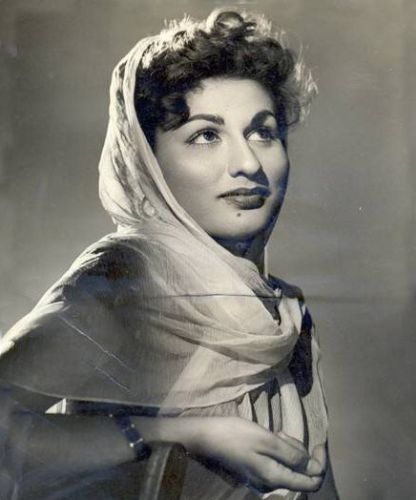
Subscribe to read full article
This section is for paid subscribers only. Our subscription is only $37/- for one full year.
You get unlimited access to all paid section and features on the website with this subscription.
Not ready for a full subscription?
You can access this article for $2 , and have it saved to your account for one year.
- Born: 25 December, 1926 (Jhelum, Punjab, Undivided India)
- Died: 9 December, 2008
- Primary Cinema: Hindi
- Parents: Miyan Ehsan-Ul-Haq
- Spouse: Nasir Khan
- Children: Ayub Khan
Known for her bold, vivacious and modern persona, Begum Para acted in approximately 27 films in the course of her career spanning 15 years. Considered India’s first pin-up girl after her photographs were published in America’s popular Life magazine in 1951, her fame spread internationally. Making her film debut in Chand (1944), she went on to star in films such as Chhamia (1945), Shalimar (1946), Sohni Mahiwal (1946), Zanjeer (1947), Jharna (1948), Shahnaz (1948), Suhaag Raat (1948), Suhagi (1948), Laila Majnu (1953), Jalwa (1955), Lutera (1955), Kar Bhala (1956), Kismet Ka Khel (1956), and Aadmi (1957). In the sunset of her life, she returned for a final appearance in Sanjay Leela Bhansali’s Saawariya in 2007, playing Badi Ammi.
Born on 25 December, 1926 in Jhelum, her father Miyan Ehsan-Ul-Haq, who originally hailed from Jalandhar, was a judge. He eventually retired from the post of Chief Justice from Rajasthan. During her growing years, as her father would get posted in the various princely states of undivided India, Begum Para was admitted to a hostel in Aligarh in order for her studies to continue uninterrupted by frequent transfers. She completed her education up till standard 12.
Her family was open-minded and liberal. When her brother, who worked with Bata in Calcutta, expressed his wish to marry Bengali actress Protima Dasgupta, there was no opposition from his father. The newlywed couple moved to Bombay shortly and Dasgupta went on to play the main lead in Kardar’s film Namaste (1943). When Begum Para came down to Bombay to stay with her brother and sister-in-law during her school vacations, she also came in contact with a few members of the film fraternity. Soon, she was offered the lead role in the Pune-based Prabhat Pictures’ Chand (1944) by Baburao Painter, who was one of the partners of Prabhat Pictures. Directed by D D Kashyap, Chand saw Begum Para star opposite Prem Adib, with popular kathak dancer Sitara Devi also essaying a key role in the film.
Over the next 15 years, Begum Para went on to feature in several films, playing the female lead in films such as Chhamia (1945), Shalimar (1946), Sohni Mahiwal (1946), Zanjeer (1947), Mehandi (1947), Neel Kamal (1947), Jharna (1948), Shahnaz (1948), Suhaag Raat (1948), Suhagi (1948), Dada (1949), Mehrbani (1950), Pagle (1950), Ustad Pedro (1951), Najaria (1952), Dara (1953), Laila Majnu (1953), Naya Ghar (1953), Jalwa (1955), Lutera (1955), Sau Ka Note (1955), Shahzada (1955), Sitara (1955), Kar Bhala (1956), Kismet Ka Khel (1956), and Aadmi (1957).
Incidentally, Chhamia, Jharna and Pagle were produced and directed by her sister-in-law Protima Dasgupta. Begum Para herself was the co-producer of all three films. Neel Kamal in which she starred also featured Raj Kapoor and Madhubala who started their respective careers with the same film.
Her fame spread internationally after her photographs were published in America’s popular Life magazine in 1951. She willy-nilly became India cinema’s first pin-up girl after American soldiers serving in the Korean war between 1950-1953 became enamored with her pictures which were invariably to be found plastered on the walls of their barracks.
In 1958, Begum Para married Nasir Khan, the younger brother of superstar Dilip Kumar. Nasir Khan had acted with Para in films such as Dalsukh M Pancholi’s Lutera, Bhagwan Dada’s Kar Bhala, and Kumar Anand’s Aadmi. While she continued to get good offers post-marriage, she preferred to focus on home and hearth. Aadmi was thus her last film as a lead actress.
She later stepped into film production with Zid (1974), starring Sanjay Khan, Saira Banu and Danny Denzongpa. The film was directed by her husband Nasir Khan. Tragedy struck when Begum Para and Nasir Khan went to Dalhousie location-hunting for their next schedule. On their way back, Khan suffered a massive heart attack during their stay in Amritsar, and passed away. It was a very challenging time for Begum Para, as her children were young, and she had already invested considerable money in the film under production. On the persuasion of her sister and brother who had settled down in Pakistan, Begum Para migrated to Pakistan. However, she found it difficult to adapt to the conservative society and returned to India.
After staying away from the cameras for approximately 50 years, Begum Para was wooed back to the silver screen by filmmaker Sanjay Leela Bhansali. She played the grandmother Nabila or Badi Ammi in his 2007 romantic film Saawariya. The film marked the debut of Ranbir Kapoor and Sonam Kapoor. Admitting that she had doubts about returning to the cameras, Begum Para also later declared that after shooting, she felt like she had never gone away.
Begum Para was connected to the film industry through her relatives. Her husband Nasir Khan was the younger brother of screen sensation Dilip Kumar. Her elder sister Zarina’s daughter Rukhsana Sultana was married to Khushwant Singh’s younger brother Shivendra Singh. Rukhsana is the mother of actress Amrita Singh. Begum Para’s son Ayub Khan also made his mark as an actor in films and TV.
Way ahead of her time, Begum Para was known to declare that she did not bother to disguise her drinks with cola as other actresses of her time did, when consuming alcohol was considered a taboo. She shared a close friendship with Nargis, Geeta Bali, Nadira, Shyama and Nilofer. They were known to enjoy fun times together.
Begum Para passed away at the age of 82 on 9 December, 2008.
-
Filmography (31)
SortRole
-
Do Mastaane 1958
-
Aadmi 1957
-
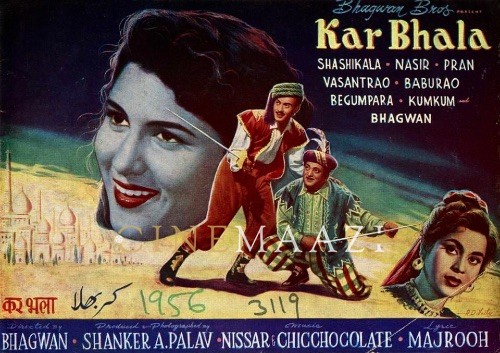
Kar Bhala 1956
-
Qismat Kaa Khel 1956
-
Kismet Ka Khel 1956
-

Sitara 1955
-
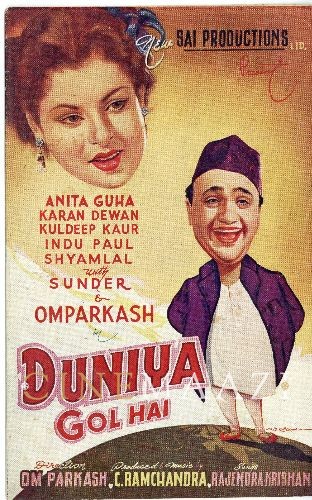
Duniya Gol Hai 1955
-
Lutera 1955
-
Sau Ka Note 1955
-
Shahzada 1955
-
Ashtalli 1954
-
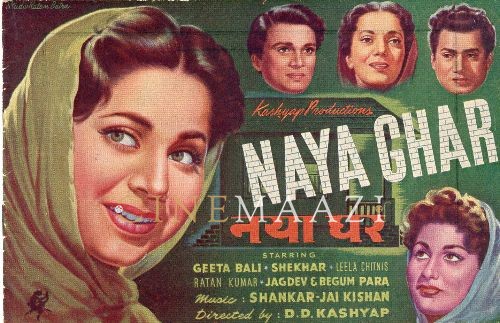
Naya Ghar 1953
-







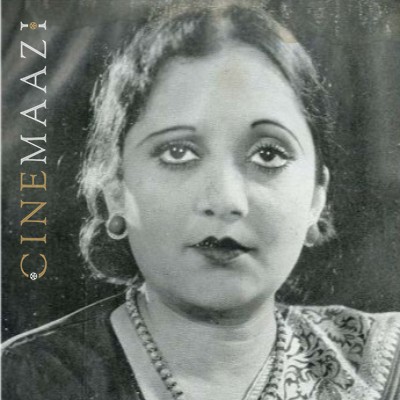

.jpg)



